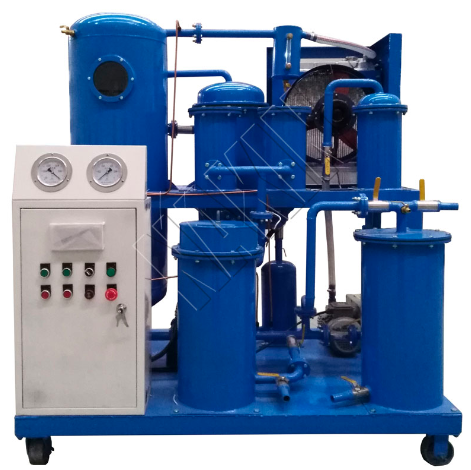Lubrication Oil Purifier: Enhancing Oil Quality and Equipment Efficiency

A lubrication oil purifier is a specialized device designed to maintain the quality of lubrication oil by removing contaminants such as water, particulate matter, and gases. Proper maintenance of lubrication oil is essential for ensuring the smooth operation and longevity of machinery and equipment. This article explores the functionality, benefits, and key considerations for selecting a lubrication oil purifier
What is a Lubrication Oil Purifier?
A lubrication oil purifier is equipment used to clean and restore the quality of lubrication oil by eliminating impurities. Lubrication oil is critical for reducing friction, wear, and tear in machinery components. Over time, oil can become contaminated with particles, water, and other substances that can impair its performance. A lubrication oil purifier helps maintain the oil’s effectiveness, ensuring optimal machinery performance.
How Lubrication Oil Purifiers Work
Lubrication oil purifiers employ various technologies to remove contaminants from oil:
- Filtration: This method involves passing the oil through filters that capture solid particles, such as dirt, metal shavings, and dust. Filters can be disposable or reusable, depending on the purifier’s design.
- Centrifugation: In this process, oil is subjected to high-speed rotation in a centrifuge, which uses centrifugal force to separate heavier particles and water from the oil. The contaminants are then removed, leaving the clean oil.
- Coalescence: Coalescing filters are used to combine small water droplets into larger ones, making it easier to separate water from the oil. The larger droplets are then removed from the oil.
- Vacuum Dehydration: This technique applies a vacuum to lower the boiling point of water, allowing it to evaporate from the oil. The water vapor is then condensed and removed, resulting in dry oil.
- Absorption: Some purifiers use materials that absorb contaminants from the oil. These materials need to be replaced or regenerated periodically to maintain effectiveness.
Benefits of Using a Lubrication Oil Purifier
1. Improved Machinery Performance
Clean lubrication oil is essential for the smooth operation of machinery. By removing contaminants, lubrication oil purifiers ensure that the oil maintains its lubricating properties, which helps reduce friction and wear on moving parts.
Read also: What role does technology play in advancing global education, particularly in under-resourced areas?
2. Extended Equipment Lifespan
Contaminants in lubrication oil can cause damage to machinery components, leading to increased maintenance needs and reduced equipment lifespan. Regular use of a lubrication oil purifier helps protect equipment and extend its operational life.
3. Reduced Maintenance Costs
By keeping the lubrication oil clean, oil purifiers help reduce the frequency of oil changes and prevent oil-related failures. This leads to lower maintenance costs and minimizes the risk of unexpected downtime.
4. Enhanced Safety
Contaminated oil can lead to unsafe operating conditions and potential equipment failures. A lubrication oil purifier helps maintain a safe working environment by ensuring that the oil is clean and effective.
5. Environmental Benefits
Using a lubrication oil purifier reduces the need for frequent oil changes, which decreases the amount of waste oil generated. This has positive environmental implications by reducing oil disposal and contamination.
Key Features to Consider in a Lubrication Oil Purifier
1. Filtration Efficiency
The efficiency of the lubrication oil purifier is crucial for effective contaminant removal. Look for a purifier that offers high-quality filtration to ensure that the oil is thoroughly cleaned.
2. Capacity and Flow Rate
Choose a purifier with a capacity and flow rate that suits the needs of your application. The purifier should be capable of handling the volume of oil and the rate at which it needs to be processed.
3. Technology and Design
Evaluate the technology used in the lubrication oil purifier, such as filtration, centrifugation, coalescence, or a combination. The design should be appropriate for the type of oil and contaminants being addressed.
4. Maintenance Requirements
Consider the maintenance needs of the purifier. Opt for a model that features easy access to components and straightforward maintenance procedures to ensure long-term reliability.
5. Control and Monitoring
Advanced lubrication oil purifiers may include control and monitoring features that allow for precise adjustments and real-time tracking of oil quality. Features like digital displays and automated controls can enhance usability.
Tips for Selecting the Right Lubrication Oil Purifier
1. Assess Application Requirements
Identify the specific needs of your application, including the type of lubrication oil, the nature of contaminants, and the volume of oil to be purified. This will help you choose a purifier that meets your requirements effectively.
2. Evaluate Size and Space
Ensure that the lubrication oil purifier fits within your available space and integrates well with your existing setup. Consider the dimensions and placement options of the unit.
3. Research Manufacturer and Model
Select a lubrication oil purifier from a reputable manufacturer known for producing reliable and high-quality equipment. Research customer reviews and product specifications to ensure the purifier’s performance and durability.
4. Consider Total Cost of Ownership
Evaluate the total cost of ownership, including the purchase price, operating costs, and maintenance expenses. Choose a purifier that offers good value and long-term benefits.
5. Check Warranty and Support
Ensure that the manufacturer provides a comprehensive warranty and reliable customer support. A strong warranty and good support services are essential for addressing any potential issues and protecting your investment.
Conclusion
A lubrication oil purifier is an essential tool for maintaining high-quality lubrication oil in various industrial and mechanical applications. By removing contaminants, lubrication oil purifiers improve machinery performance, extend equipment lifespan, reduce maintenance costs, and contribute to a safer and more environmentally friendly operation. Understanding the key features, benefits, and selection criteria helps you choose the right lubrication oil purifier for your specific needs, ensuring efficient and reliable equipment operation.





